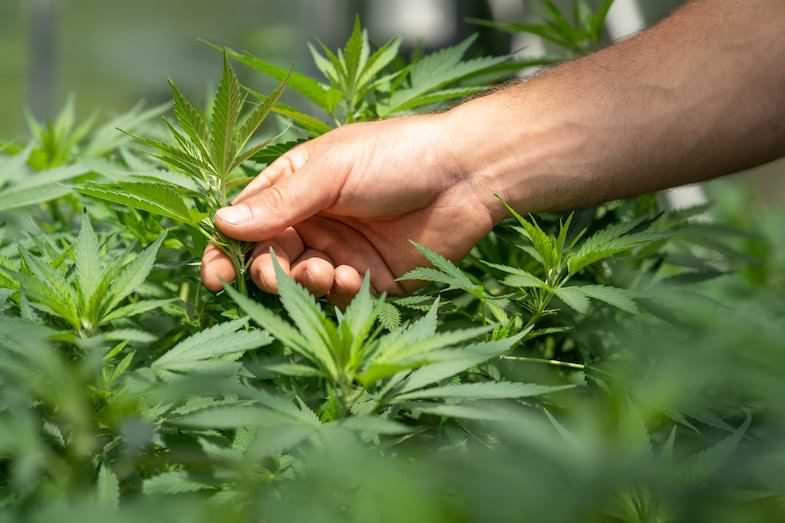Modified on: 09/08/2024
The effects of CBD explained
Imagine a natural remedy that holds the promise of pain relief, reduced anxiety, and improved overall well-being without causing a sense of intoxication.
Enter CBD, a non-psychoactive compound derived from the cannabis plant that has been making waves in the medical community. As curiosity about CBD continues to rise, so does the need to understand how it works and the impact it has on our brain.
In this comprehensive exploration, we aim to unravel the mysteries of CBD’s effects on the brain, offering insights into its potential as a therapeutic agent for a myriad of health conditions.
What is CBD and how does it work?
CBD is none other than one of the more than 60 cannabinoids present in the cannabis plant. It is a non-psychoactive chemical compound that can be used for medicinal purposes. According to a report by the World Health Organisation in 2018, no consequences related to addiction or states of abuse have been detected for CBD.
But how does CBD work?
Once it is consumed in various ways, it interacts with our body’s endocannabinoid system, which is made up of neurotransmitters that connect to cannabinoid receptors and proteins.
The ECS, therefore, acts as a bridge between the brain and the body and is responsible for sensations such as pain, sleep, appetite, immune response and much more.
But how do the effects of CBD on the brain unfold?


The effects of CBD on the brain
As we have seen, CBD is a substance that interacts with the endocannabinoid system that plays a fundamental role throughout our bodies. CBD, therefore, allows us to feel less pain, less inflammation, reduced stress levels and other benefits for the whole body.
Let us see in the next few lines what CBD effects on the brain.
Pain relief
At least once in our lives, we have all experienced physical pain. However, in some cases, it is something chronic that we carry with us every day. You should know that, one of the main reasons why people use CBD is because of its ability to relieve all types of pain, even chronic and particularly acute ones.
There are plenty of over-the-counter drugs that can be administered to treat these pains. However, CBD is considered among the safest because it is non-addictive and can help relieve pain caused by fibromyalgia, arthritis and neuropathic pain.
Treatment for anxiety and depression
One of the reasons why more and more people are turning to CBD is because of its properties that are able to calm the mind and body. In fact, you should know that more than 300 million people worldwide suffer from depression. For decades, treatment for such health conditions has taken the form of therapy, counselling or prescription drugs. However, in some cases, these treatments do not have the desired effects.
CBD can greatly reduce symptoms caused by anxiety and depression simply because it interacts positively with serotonin receptors in the brain, a neurotransmitter that is able to influence mood and emotional state.
In this sense, it is important to emphasise that balanced levels of serotonin are indeed important in dealing with conditions such as depression. In fact, unbalanced serotonin levels are capable of ensuring states of anxiety and disorders of various kinds.
Less stress
Stress is also one of the disorders that many people experience and is particularly common. Being in a constant state of stress is certainly not normal, although a minimum of stress can be considered physiological and even positive, from a certain point of view.
However, as mentioned, chronic stress can negatively affect your physical, mental and emotional well-being. There are many ways to minimise the impact of stress on your body. One of these is CBD, which changes the way your brain reacts to states of anxiety by affecting the blood flow in certain areas of your brain.
Sleep better
You are probably aware that sleeping the right amount of hours does not guarantee restful sleep. In fact, many people constantly struggle to achieve the quality sleep they need to be able to tackle a number of important tasks the next day. If this does not happen, being tired is only one of the problems you will experience: it will also affect your physical and mental well-being.
The reasons why people do not sleep at night are numerous.
Some are always in a hurry, others think of a thousand problems. Still others may feel chronic pain. As you have no doubt realised, CBD is able to ease the mind and minimise pain. This also has an important impact on the quality and quantity of sleep.
Protects the brain
CBD also has neuroprotective properties that help protect the brain from damage caused by stress and other sources. Some believe that CBD oils may also be relevant to those suffering from dementia, Parkinson’s, and Alzheimer’s disease.
The reason why this would happen is related to the way this substance reacts with CB2 receptors that are present in the brain. As we understand, CBD reacts with these receptors by creating a response in the immune system and reducing the damage caused by inflammation in the brain.
Read also: Medical uses of cannabis: here are the fact
The possible side effects of CBD
Cannabidiol is an active ingredient with many beneficial effects; it is generally well tolerated by the body and causes little or no discomfort. Reports of side effects are mainly related to dry mouth and a feeling of tiredness, but episodes of dysentery, nausea and drowsiness may occur in some cases.
One of the most potentially serious adverse effects is low blood pressure, so it is always best to seek medical advice before trying legal cannabis products.
Effects on appetite occur with either increased hunger or decreased appetite, and should be monitored depending on the individual’s characteristics. All in all, the therapeutic properties of CBD far outweigh the side effects.
Let’s look at all the possible side effects of CBD.
Dry mouth
Have you read that CBD can increase thirst? Or that it makes your mouth feel dry?
Dry mouth is one of the most common side effects for cannabis users, which can occur with both THC and CBD, although with the latter it is much rarer. Dry mouth caused by hemp inflorescences is easily resolved by drinking some water or a sweet drink.
However, the sensation one experiences should not be equated with thirst or dehydration, but can be described as a lack of saliva inside the jaws. In fact, dry mouth due to cannabinoids is caused by reduced functioning of the salivary glands, and is known as xerostomia.
Basically, CBD and THC interact with cannabinoid receptors located in the salivary glands that produce saliva, temporarily decreasing their function.
This explains why dry mouth occurs not only with combustion or vaping, but also with other types of intake.
To be more precise, it must be said that with THC this effect is due to its direct interaction with CB1 receptors. CBD, on the other hand, does not act directly on this type of receptor, but causes an increase in the amount of anandamide, leading to the same consequences.
Tiredness and asthenia
Feeling tired and wanting to relax is another side effect that can result from CBD. Generally, people turn to CBD precisely to feel more focused and energetic and to re-establish circadian sleep-wake rhythms. One of the positive effects of the active ingredient is precisely its ability to balance sleep and improve concentration in times of stress.
Nevertheless, it may happen that an overdose of CBD or the first approaches with the molecule may result in asthenia, headaches or chronic fatigue syndrome (CFS).
To avoid this, it is advisable to approach CBD with a very low dosage and to prefer evening use.


Changes in appetite
Are you concerned that CBD affects your appetite? Have you heard that CBD may increase hunger or, conversely, decrease it?
Anecdotally, it is very common to hear that CBD affects appetite, either by increasing the feeling of hunger or by inhibiting the desire to eat.
Changes in appetite are not uncommon in legal weed users but, in general, it seems that the active ingredient acts differently in different individuals. In some people, it tends to increase metabolism and, consequently, the need to eat. In others, on the contrary, there is a decrease in appetite and subsequent weight loss.
Nausea
Some users report feeling or experiencing a sensation of nausea following the use of CBD. However, this is an individual perception that varies depending on:
- The type of product chosen
- The amount taken
- One’s body’s reaction to it
On the other hand, it should be noted that there is a lot of ongoing research into the anti-emetic effects of cannabis on chemotherapy –induced nausea and vomiting.
Should you experience a feeling of nausea caused by CBD, our advice is to vary the dosage or turn to other CBD products.
Low blood pressure
Do you have cardiovascular problems or suffer from low blood pressure? If so, it is essential that you know that CBD can sometimes cause low blood pressure.
Despite this, it can happen that an overdose of CBD or the first approaches with the molecule can cause some asthenia, headaches or chronic fatigue syndrome (CFS). In this regard, an interesting contribution comes from a 2015 study on the treatment of children with epilepsy with CBD extracts.
This effect is not common and is only felt in sporadic cases, but it should nevertheless be taken into account. In some subjects, in fact, even a minimal change in pressure can have serious repercussions.
Although this is among the more serious side effects of CBD, it must also be said that scientific studies show that in times of stress, CBD modulates the reaction of the cardiovascular system, reducing the reaction to tension.
A paper on this subject was published in 2017, explaining how a dose of cannabidiol reduced blood pressure in nine healthy volunteers. Researchers concluded after the study that CBD lowers blood pressure at rest. In addition, analysis showed that the stress response decreased following cannabidiol intake. The effects on blood pressure, according to the research team, could be related to the anxiolytic properties of CBD.
Diarrhoea
From the accounts of cannabis users, among the most annoying side effects of CBD are intestinal disorders. Confirmation of this also comes from scientific research that mentions diarrhoea as a side effect of CBD in several studies.
One of them concerns the long-term effects of cannabidiol in patients with severe epilepsy – one of the diseases that can be treated with cannabinoids – in which more than one third of those treated experienced diarrhoea.
However, in most cases, it appears that the gastrointestinal symptoms are related to the carrier oils used in the formulation of CBD oil.
Typically, carrier oils – such as hemp oil, coconut oil, medium-chain triglyceride (MCT) oil, olive oil – are used in the production of cannabis oils, which facilitate the absorption of the active ingredients contained in the oil.
In some cases, however, the gastrointestinal system cannot tolerate certain types of oil and manifests this with episodes of dysentery.
To improve intestinal tolerance to CBD, two types of strategies can be adopted: avoid crude formulas and opt for full spectrum or broad spectrum extracts, or take the products immediately after meals.
Dizziness
In very rare cases, CBD consumption may cause dizziness and sensations of spinning and oscillating movements. The perception that the environment moves is a personal reaction to cannabidiol that cannot be predicted in advance. Each organism, in fact, responds in its own way to cannabinoids and no scientific research is available to explain why dizziness occurs.
Scientists believe that it is the activation of cannabinoid receptors in the endocannabinoid system that triggers vertigo. When CBD and THC extracts are taken, they interact with the central nervous system by giving a different stimulus to the bloodstream. Due to this momentary alteration, dizziness may be experienced.
Read also: Cannabis decarboxylation: what it is, how it works and what the benefits are
Conclusions
In conclusion, CBD, short for cannabidiol, is a non-psychoactive compound found in the cannabis plant with a wide range of potential medicinal uses. Its interactions with the endocannabinoid system in our bodies enable it to offer various benefits, making it increasingly popular among users seeking natural remedies. Among its effects on the brain, CBD has shown promise in providing pain relief for chronic and acute conditions, acting as a treatment for anxiety and depression, reducing stress levels, and improving sleep quality. Additionally, its neuroprotective properties may offer potential benefits for conditions like dementia, Parkinson’s, and Alzheimer’s disease.
While CBD is generally well-tolerated, some users may experience mild side effects, such as dry mouth, tiredness, changes in appetite, nausea, low blood pressure, diarrhea, and dizziness. These side effects are typically sporadic and generally outweighed by the therapeutic properties of CBD.
Overall, the growing body of research on CBD and its potential applications continues to shed light on its diverse benefits and how it may positively impact our well-being. As the scientific community delves deeper into understanding CBD’s mechanisms and its interactions with the human body, its potential as a valuable therapeutic option could become even more significant.
Nevertheless, it is essential for individuals to seek medical advice and carefully consider their personal health conditions before incorporating CBD into their wellness regimen.
💡Takeaways about the effect of CBD
- CBD is one of more than 60 cannabinoids found in the cannabis plant and is a non-psychoactive chemical used for therapeutic purposes.
- CBD interacts with our endocannabinoid system, which is composed of neurotransmitters that bind to cannabinoid receptors and proteins.
- CBD’s effects on the brain include pain relief, treatment for anxiety and depression, stress reduction and improved sleep.
- CBD acts positively on serotonin receptors in the brain, affecting our mood and emotional state.
- CBD has neuroprotective properties that protect the brain from damage caused by stress and other sources, and is being researched for possible benefits in neurodegenerative disorders.
- CBD is generally well tolerated by the body and causes little or no discomfort. Possible side effects include dry mouth and tiredness.
- Episodes of diarrhoea, nausea and drowsiness may occur in some cases.
- A more serious side effect may be low blood pressure, so it is advisable to consult a doctor before using legal cannabis products.
- CBD can have different effects on hunger, causing an increase or decrease in appetite, depending on the individual.
- In very rare cases, taking CBD may cause dizziness.
FAQ about the effects of CBD
What is CBD and how does it work?
CBD is one of more than 60 cannabinoids present in the cannabis plant. It is a non-psychoactive chemical compound used for therapeutic purposes. According to a 2018 World Health Organisation report, no addiction or abuse-related consequences have been found for CBD.
What are the effects of CBD on the brain?
The effects of CBD on the brain include pain relief, treatment of anxiety and depression, stress reduction and improved sleep quality. In addition, CBD has neuroprotective properties that help protect the brain from damage caused by stress and inflammation.
What are the possible side effects of CBD?
Some possible side effects of CBD include dry mouth, tiredness, changes in appetite, nausea, low blood pressure, diarrhoea and dizziness. These side effects are generally mild and well tolerated by most people, but it is advisable to consult a doctor before using CBD products, especially if you have pre-existing health conditions.









